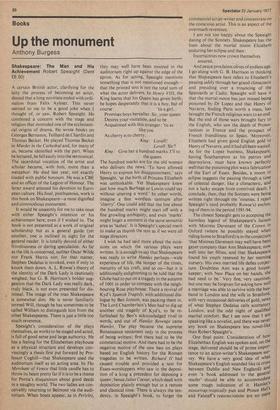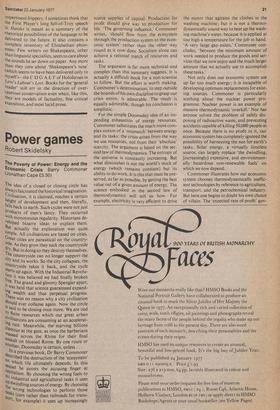Books
Up the monument
Anthony Burgess
Shakespeare: The Man and His Achievement Robert Speaight (Dent £6.50) A certain British actor, clarifying for the laity the process of becoming an actor, denied that a long novitiate ended with ordination from Felix Aylmer. This never seemed to me to be a good joke when I thought of, or saw, Robert Speaight. He combined a concern with the stage and religion that reminded one of the ecclesiastical origins of drama. He wrote books on Georges Bernanos, Teilhard de Chardin and Thomas Becket. He played Thomas Becket in Murder in the Cathedral and, for many of us, became identified with the part. When he lectured, he fell easily into the sermonical. The sacerdotal vocation of the artist and scholar became, with him, more than a metaphor. He died last year, not exactly loaded with public honours. He was a CBE and an officer of the Legion of Honour. The latter award attested his devotion to European culture. His final, posthumous, work is this book on Shakespeare—a most dignified and commodious monument.
It would be unseemly for me to take issue with either Speaight's intention or his achievement here, even if 1 wished to. The book is not presented as a work of original scholarship but as a general guide (yet another, one is inclined to sigh) for the general reader. It is•totally devoid of either frivolousness or daring speculation. As far as the life is concerned, neither Oscar Wilde nor Frank Harris nor, for that matter, Stephen Dedalus is invoked, even if only to knock them down. A. L. Rowse's theory of the identity of the Dark Lady is cautiously weighed, but G: B. Harrison's bolder suggestion that the Dark Lady was really dark, truly black, is not even presented for dismissal. The image of the man Shakespeare is somewhat dim. He is never familiarly termed Will, though he has sometimes to be called William to distinguish him from the other Shakespeares. There is just a little too much reverence.
Speaight's consideration of the plays themselves, as works to be staged and acted, is full of good sense and large authority. He has a feeling for the Elizabethan playhouse as a physical structure and develops convincingly a thesis first put forward by Professor Coghill—that Shakespeare used the auditorium itself as an .acting area, In The Merchant of Venice' that little candle has to throw its beam pretty far if it is to be a theme for Portia's disquisition about good deeds in a naughty world. The two ladies are conceivably returning to Belmont via the auditorium. When boats appear, as in Pericles, they may well have been moored in the auditorium right up against the edge of the apron. As for acting, Speaight mentions something that is not mentioned enough— that the printed text is not the total sum of what the actor delivers. In Henry VIII, the King learns that his Queen has given birth; he hopes desperately that it is a boy, but of
course: 'tis a girl. Promises boys hereafter. Sir, your queen Desires your visitation, and to be Acquainted with this stranger: 'tis as like you As cherry is to cherry.
King: Lovell!
Lovell.. Sir ? King: Give her a hundred marks. I'll to the queen.
The hundred marks are for the old woman who delivers the news. 'To have allowed Henry to express his disappointment,' says Speaight, 'at the birth of Princess Elizabeth was unthinkable. Yet Shakespeare knew just how much Burbage or Lowin could say without uttering a word.' In other words, imagine a fine wordless tantrum after 'cherry'. One could add that the line about the hundred marks might start off with a fine growling ambiguity, and even 'marks' might linger a moment in the same semantic area as 'lashes'. It is Speaight's special merit to make us thumb the text as if we were all stage directors.
1 wish he had said more about the occasions on which the various plays were written. It is enough to say that Shakespeare was ready to write Hamlet perhaps—wide experience of life, the temper of the times, maturity of his craft, and so on—but it is additionally enlightening to be told that the Globe had to put on a tragedy in the autumn of 1601 in order to compete with the neighbouring Rose playhouse. There a revival of Kyd's Spanish Tragedy, with additional dialogue by Ben Jonson, was packing them in. The Lord Chamberlain's Men had to dig up another old tragedy of Kyd's, to be refurbished by Ben's acknowledged rival in words, and out of Hamlet Revenge came Hamlet. The play became the supreme Renaissance testament only in the process of being written; first there had to be the commercial motive. And there had to be the • negative motive of the new ban on plays based on English history for the Roman tragedies to be written. Richard II had caused trouble and provided a text for Essex-worshippers who saw in the deposition of a king a precedent for deposing a queen ; hence Julius Caesar, which dealt with deposition plainly enough but in a remote and classical time. There is always the tendency, in Speaight's book, to forget the commercial script-writer and concentrate on the conscious artist. This is an aspect of the overmuch reverence.
I am not too happy about the Speaight dating of the Sonnets. Shakespeare has the lines about the mortal moon Elizabeth enduring her eclipse and then : Incertainties now crown themselves assured,
And peace proclaims olives of endless age. I go along with G. B. Harrison in thinking that Shakespeare here refers to Elizabeth's passing safely through her grand cliinacteric and presiding over a trouncing of the Spaniards at Cadiz. Speaight will have it that the mortal moon has just missed being poisoned by Dr Lopez and that Henry of Navarre, finding Paris worth a mass, has brought the French religious wars to an end. But the end of those wars brought fury to the English, who saw the death of Protestantism in France and the prospect of French friendliness to Spain. 'Moreover, Elizabeth had given good English gold to Henry of Navarre, and it had all been wasted. As for the Lopez business, Shakespeare, having Southampton as his patron and dearmylove, must have known perfectly well that the poisoning plot wasa fabrication of the Earl of Essex. Besides, a moon in eclipse suggests the passing through a time of celestial danger, like a climacteric, and not a lucky escape from contrived death. I conclude, then, that the Sonnets were being written right through the 'nineties. 1 reject Speaight's (and probably Rowse's) enclosing of them in the period 1591-94.
The closest Speaight gets to accepting the harmless legend of Shakespeare's liaison with Mistress Davenant of the Crown in Oxford (where he possibly stayed when riding home to Stratford) is in the conjecture 'that Mistress Davenant may well have been gayer company than Ann Shakespeare, now well into her fifties, and that Shakespeare found his youth renewed by her teeming nursery. His own married life defies conjecture. Doubtless Ann was a good housekeeper; with New Place on her hands, she had need to be.' Very fine, very cautious, but one may be forgiven for asking how welt a marriage was able to survive with the husband in London and the wife in Stratford, with very occasional deliveries of gold, news of what Stephen Dedalus calls scortatorY London, and the odd night of qualified marital comfort. But I see now that I am speaking like a novelist, and there was never any book on Shakespeare less novel-like than Robert Speaight's.
One final point. Consideration of how Elizabethan English was spoken and, on the stage, delivered should be of prime importance to an actor-writer's Shakespeare survey. We have a very good idea of what Shakespeare's English sounded like (a crns_s, between Dublin and New England) an", even 'a book addressed to the genera' reader' should be able to accommodat,e some rough indication of it. Harnlet,s mousetrap/tropically pun and Prince Hal s and Falstaff's reasons/raisins are no mere
impertinent frippery. I sometimes think that the First Player's long fall-of-Troy speech in Hamlet is meant as a summary of the rhetorical possibilities of the language to be delivered to the future. It also contains a complete inventory of Elizabethan phonemes. Few writers on Shakespeare, other than linguistic specialists, seem to care about the sounds he set down on paper. Any more than they care about 'Shakespeare's tune' (which seems to have been delivered only to myself )—the CDGAEF of Holofernes in Love's Labour's Lost. Books for the 'general reader' still err in the direction of overcautious conservatism even when, like this, they are models of factuality, fine critical exposition, and most lucid prose.



































 Previous page
Previous page